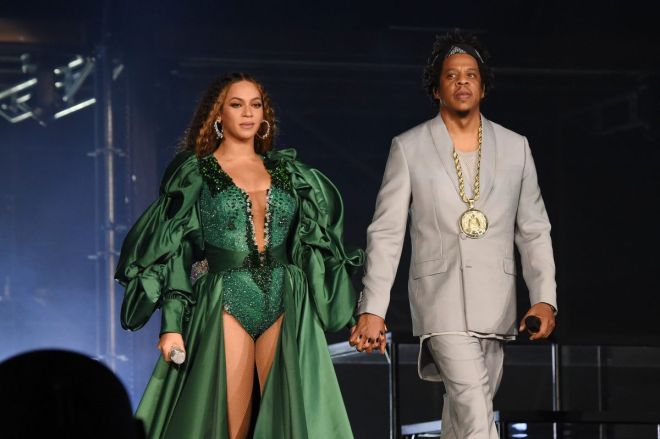‘I Was Horrified’: Basquiat’s Close Friends Speak Against Beyoncé And Jay-Z’s Tiffany Ad
Cardi B Gives Birth To Her Second Child: ‘We Are So Overjoyed To Finally Meet Our Son’
September 7, 2021NOC Interview: Sydney Sweeney and Justice Smith Talk All Things ‘The Voyeurs’
September 8, 2021‘I Was Horrified’: Basquiat’s Close Friends Speak Against Beyoncé And Jay-Z’s Tiffany Ad

Kevin Mazur
Beyoncé and Jay-Z continue to receive backlash over their About Love campaign for Tiffany & Co. which debuted in August.
In the advertisement, Bey gives Holly Golightly vibes as an ode to the 1961 classic film Breakfast At Tiffany’s while she sports the jeweler’s priceless yellow diamond — a gem only worn by five other women in history since it was taken from South Africa in 1877 by the brand’s founder Charles Lewis Tiffany.
As MADAMENOIRE detailed in our initial reporting, a part of the newsworthiness of the campaign surrounded Beyoncé being the first Black woman to get the honor of wearing Tiffany’s yellow diamond.
Perhaps more interestingly, buzz also surrounded the fact that Bey and Jay posed for the shoot in front of a never before seen by the public Basquiat painting known as Equals Pi, which seemingly featured the jewelers signature “robin-egg” blue.
In the weeks following the campaign’s release, almost every aspect of it has come into question. Was Beyoncé’s feature in the campaign “as the first Black woman” to rock the gem just a tokenistic ploy by Tiffany to create buzz? Why was Beyoncé picked to rock a diamond “stolen from Africa?” Why would she and Jay-Z even agree to do the campaign? Was the brand only donating $2 million to HBCU’s in partnership with the power couple to cover up the problematic nature of the advertisement overall?
Moreover, conversation continues to swirl over the politics concerning Basquiat’s artwork in the advertisement — questioning whether the legendary 1980s NYC artist would have signed off on his artwork been placed in the campaign.
Shortly after About Love was released, Tiffany & Co.’s VP Alexandre Arnault suggested that the artist’s usage of the particular shade of blue was intentional, and even an ode to the high-end jeweler.
“We don’t have any literature that says he made the painting for Tiffany,” Arnault said in an interview with WWD. “But we know a little bit about Basquiat. We know his family. We did an exhibition of his work at the Louis Vuitton Foundation a few years back. We know he loved New York, and that he loved luxury and he loved jewelry. My guess is that the [blue painting] is not by chance. The color is so specific that it has to be some kind of homage.”
Yet and still, for those who love Basquait’s work, have studied it, and were close to the late artist before he passed away in 1988, Bey and Jay’s Tiffany campaign serves as the antithesis of what the artist’s work stands for.
To them, Basquiat’s art, in part, is about encouraging people to question the capitalist ideals promoted to society through the efforts of mainstream advertising, subverting tokenism and against elitism and classism.
Alexis Adler, who lived with the artist during the early years of his art career from 1979-1980, recently shared her reaction to the controversial campaign.
“I’d seen the ad a couple days ago and I was horrified,” Adler told The Daily Beast.
“The commercialization and commodification of Jean and his art at this point—it’s really not what Jean was about,” she went onto express.
“Unfortunately, the museums came to Jean’s art late, so most of his art is in private hands and people don’t get to see that art except for the shows. Why show it as a prop to an ad?” Adler questioned. “Loan it out to a museum. In a time where there were very few Black artists represented in Western museums, that was his goal: to get to a museum.”
A close friend of Basquiat’s who worked with the latter as teens via their graffiti art duo SAMO, similarly expressed that the placement of Equals Pi in Tiffany’s campaign has no contextual regard for Basquiat or his work.
“People think that his association with luxury was because he was impressed with that sh*t, but he couldn’t care less,” Al Diaz emphasized. “It’s not just about wearing an Armani suit. If he wore it, it’s because he could buy it and fuck it up, it wasn’t because the stitches were fabulous or well-made.”
“It’s lost in translation,” he added on Basquiat’s message in light of Bey and Jay’s Tiffany ad. “People won’t see the depth. At this point the only people that could afford a Basquiat are people he was targeting. Like, you’re the oppressor. They buy it out so that it becomes meaningless.”
Basquiat’s assistant Stephen Torton shared strong opinions on the campaign. As a man who worked closely with the artist — mixing paints for Basquiat and framing a countless amount of the creative’s paintings — Torton said that despite the background color of Equals Pi, Tiffany was never the artist’s inspiration.
“The idea that this blue background, which I mixed and applied was in any way related to Tiffany Blue is so absurd that at first I chose not to comment,” Torton posted on Instagram. “But this very perverse appropriation of the artist’s inspiration is just too much.”
“They wouldn’t have let Jean-Michel into a Tiffany’s if he wanted to use the bathroom, or, if he went to buy an engagement ring and pulled a wad of cash out of his pocket. We couldn’t even get a cab,” Torton told The Daily Beast.
Later he added, “I don’t know the truth but I know a lie when I see one.”
